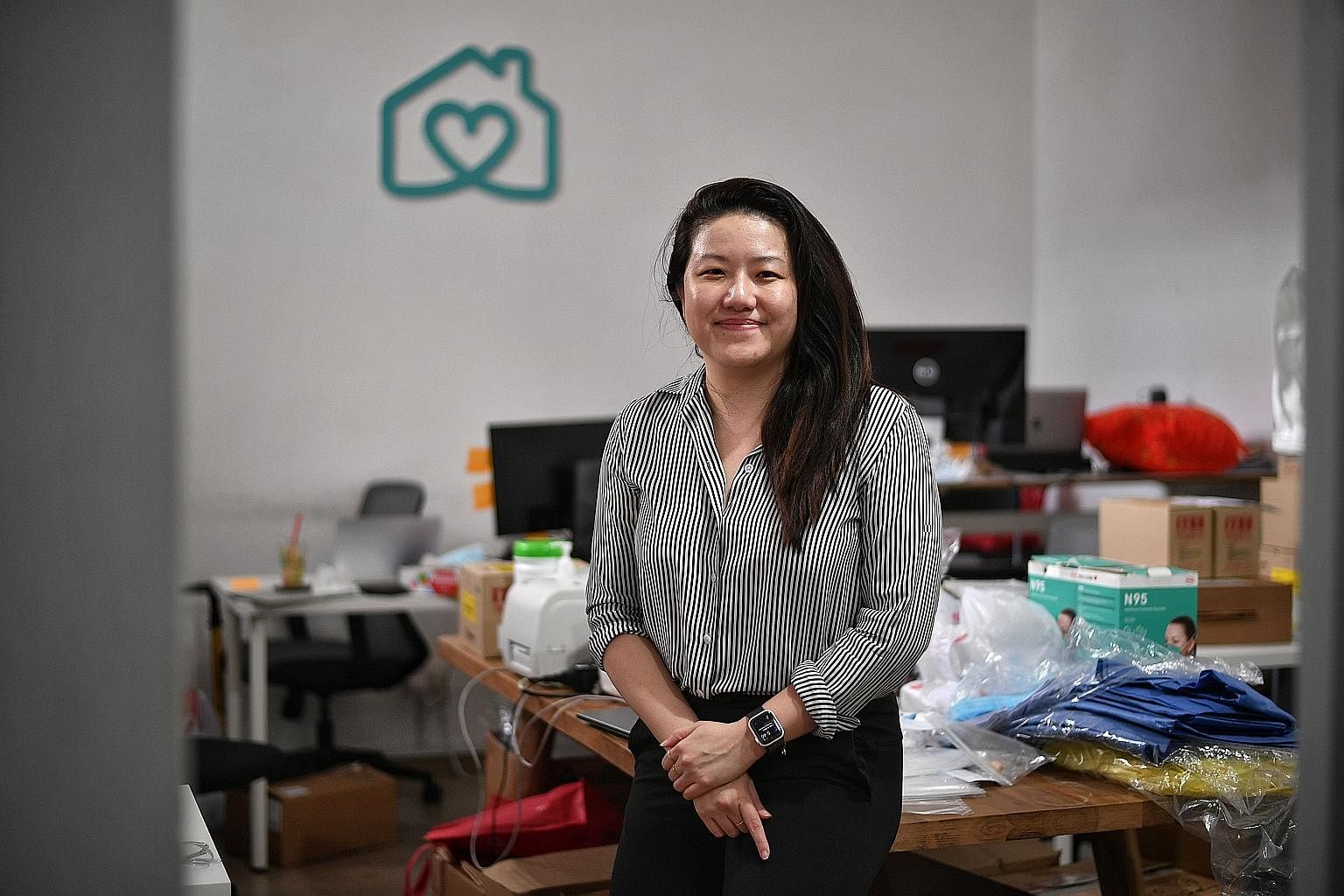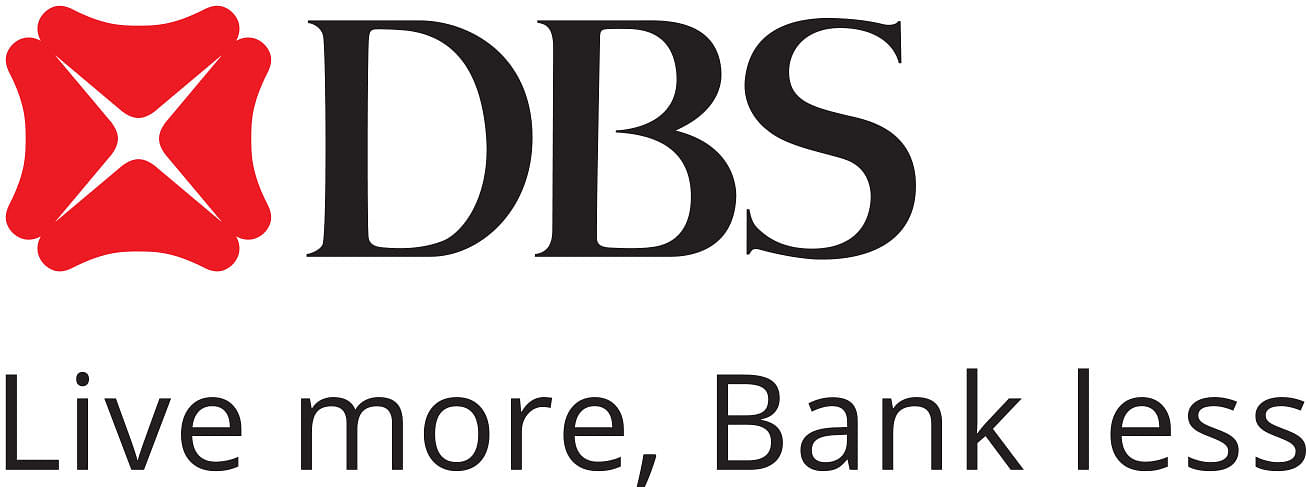-
The fourth in an eight-part series on purpose-driven businesses committed to solving challenging issues of our time.
Portraits of Purpose
Healthcare start-up owner builds small Covid army to battle pandemic in Singapore
Gillian Tee's childhood experience led her to launch a home and nursing care start-up, which has played a critical role in the face of Covid-19
Ms Gillian Tee pulls a face and moans: "I'm tired."
Her voice drips with mock woe, but the fatigue is real. Since the pandemic started, the 37-year-old founder of Homage - a home and nursing care start-up - has been pulling long days and late nights.
"We never expected to play such a role in the fight against Covid-19," says Ms Tee, whose outfit has trained and been fielding an army of about 400 health professionals to, among other things, operate mobile health screening stations, carry out swab testing and give telemedicine consultations.
"They have gone into quarantine zones, nursing homes, hospitals and migrant worker communities and dormitories," she says proudly.
Indeed, Homage has come a long way from 2017, when it began as an app matching clients who need home-based care to a pool of about 250 nurses.
In three years, that pool has grown tenfold and now boasts a network of about 3,000 care professionals, including doctors and physiotherapists.
Beyond just eldercare, Homage offers a suite of home and nursing care services - from medical escorting to facility-based care in hospital wards to support for children with muscular dystrophy and other illnesses or disabilities.
"Our team no longer just goes into homes, but also daycare centres, nursing homes and hospitals," says Ms Tee.
The events of the last nine months have also shown that Homage can play a critical role in the event of a health crisis.
The coronavirus was a bolt from the blue, Ms Tee says. "We just felt this strong sense of urgency to act because we knew that with the number of healthcare professionals on our platform, we couldn't sit back and needed to be a part of the solution.
"At a time like this, do we hide in a corner and cover our faces? No," she says emphatically.
Still, she was blown away by just how many in her team rose to the occasion.
"The responders all raised their hands and said 'count me in'," she says. "They could have chosen to take a back seat, but instead continued to help those who needed help and stayed true to the healthcare and caregiving profession of being there in good and bad times."
The pandemic, she says, has been good for business "but not in the kind of trajectory we expected".
"But it has certainly consolidated our belief in what we do," she says.
Homage has expanded into Malaysia and raised more than $10 million in Series B funding earlier this year.
Psychologist Jeffrey Arnett of Clark University once described millennials - those born between 1981 and 1996 - as "an exceptionally generous generation that holds great promise for improving the world".
Ms Tee - who has a Master of Business Administration from Columbia Business School as well as a master's in international affairs from Columbia University - certainly lives up to that description.

Although she was enjoying a heady career in New York and Silicon Valley, where she co-founded Rocketrip, a successful travel start-up, she gave up that glitzy life to start Homage.
The reason? She has a soft spot for the elderly, having been lovingly raised by her nanny and maternal grandmother.
Personally and professionally curious - she was also once an artificial intelligence researcher, software engineer and technology consultant - she believes in living life on her own terms.
She started out with a dream to leverage technology to improve senior care in Singapore, but now wants to include the whole decentralised care continuum.
Building Homage, she says, has been a profound journey of personal growth. "I wouldn't trade that for anything in the world."
That Homage - a 2016 DBS Foundation Social Enterprise Grant awardee - has a social impact is something which makes her proud.
"Everyone is going through an existential crisis. What does it mean to personally care? How can I be there? What do I do to be there? Let's care about things that matter. Let's play a part and make it count."
You were in your early 30s when you started Homage. Isn't eldercare an odd business idea for someone so young?
I lived with my two grandmothers while growing up and I was also close to my elderly nanny, who was employed by my parents to help look after me since I was a baby.
As a result, I am familiar with the difficulties, likings, thinking, problems which are faced by seniors. Fundamentally, the elderly are people who are simply us, but in a different stage of life and their needs translate across from their desire to continue contributing to those around them.
Like us, many also need help even when they are not sick. So, I see ourselves very much in the business of simply wellness, health and caregiving, which impacts the entire family unit.
Apparently, you do not like to have things too easy and prefer to learn the hard way. How well has this attitude served you in life?
It has definitely taken me down paths filled with adventures. I think fundamentally, overcoming tough times builds grit and that translates to continued personal growth.
Not backing down from challenges has been crucial in my journey as an entrepreneur because I encounter setbacks almost on a daily basis. You just have to keep learning and not relent in spite of failures, missteps or challenges.
Ultimately, it's helped me build a team and make an impact. Homage, at the end of the day, is a business with a mission and we're serious about pushing hard and withstanding tough times for a worthy cause.
In three years, Homage has grown more than tenfold. You started with a network of just over 200 nurses, but today, have nearly 3,000 nurses, therapists, general caregivers and doctors. How did that happen?
The Homage team made that happen. When I look back, it's the process of reapplying fundamental principles over and over again that got us to where we are.
The fundamentals of building the right team; ensuring we have a culture that embraces change and a growth mindset; ensuring we are rigorous, move fast and towards a single focal point; and the impact of constant reapplication of these fundamentals when making micro decisions compounds over time.
You can achieve much more than you can imagine, given the right alchemy of people focusing on solving a worthy problem.
How has Covid-19 been a game changer for Homage?
A thought I carry with me nowadays is that if we can go through the past year, we can go through anything as a team.
When the Dorscon turned orange, we started to build a task force that was PCR (polymerase chain reaction) swab and PPE (personal protective equipment) trained as well as mask-fitted. Fast forward nine months, we've built up a task force of 400 Covid-19 responders - including trainers, nurses, care aides and doctors.
Covid-19 deepened and solidified our fundamental belief that we need to build more platforms to enable healthcare in the community at scale and also invest in community care infrastructure and preventative health programmes.
More than anything, I think the pandemic made the Homage team stronger and more united as we came together to build solutions to become part of the national response.
What are the three most profound lessons you have learnt about life and ageing since you started Homage?
First, encountering the various types of cases addressed by Homage, I have learnt from and been inspired by our own care professionals the worth of personal sacrifice, dedication and devotion towards helping others and our society. If you look back, it is often moments of personal care - akin to the care I received from seniors when I was young - that mean and count the most.
Second, ageing is a normal process and inevitable. Just because you pass a certain age doesn't make you a different person. It is important for everyone at any stage in his or her life to be treated with respect and dignity, and good physical and mental health is important for everyone - senior, adult, youth or child.
Last, the ability to link short-term objectives to long-term goals is one of the key factors for the overall continued growth of a business.
The process depends on nimble and good decision-making, optimising how resources are allocated and sound people and relationship management.
Do you believe there is a reason for everything, and that everything you have done - personally and professionally - has somehow led you here?
Definitely. Working on Homage feels like coming full circle for me. It's combining many of my worlds - technology, business or social and economic development.
I'm still growing and feeling stretched on my current journey, though. I feel like it's only just beginning and I have lots more to learn.
What does purpose mean to you?
Purpose to me is working on a cause that is personally worthwhile.
Join ST's Telegram channel and get the latest breaking news delivered to you.
A version of this article appeared in the print edition of The Sunday Times on October 04, 2020, with the headline Healthcare start-up owner builds small Covid army to battle pandemic in Singapore. Subscribe


